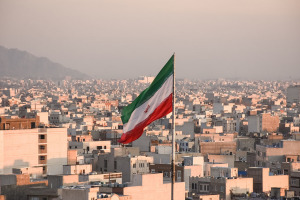Iranian Authorities Free Christian After Year in Prison
Dual Dutch-Iranian citizen of Armenian descent worked with drug-addicted Muslims
Iranian authorities on Monday released a Christian after 359 days of detainment on charges of spreading Christianity among Farsi-speaking Iranians and having ties with foreign Christian organizations, according to Mohabat News.
Authorities arrested Vahik Abrahamian, 45, a dual Iranian and Dutch citizen who belongs to Iran’s Armenian community, and his wife on Sept. 4, 2010, in Hamadan, 337 kilometers (210 miles) west of Tehran, along with another Iranian Christian couple, Arash Kermanjani and Arezou Teimouri. On April 30, authorities released Abrahamian’s wife, Sonia, along with Kermanjani and Teimouri, after they appeared in court, and Abrahamian was ultimately held in the Hamadan general prison ward.
The two couples spent 44 days in solitary confinement in the detention center of the Ministry of Information, Farsi Christian News Network (FCNN) reported.
Conditions in the prison were taxing on Abrahamian’s health, and FCNN described the prison’s hygiene conditions as “deplorable.”
Abrahamian and his wife were previously arrested and held in Tehran’s notorious Evin prison in February 2010. Authorities held them in solitary confinement for 53 days on charges of activities among the Muslim community, according to Mohabat News. They were released on bail.
The couple worked with drug addicts and other marginalized Iranians, according to FCNN. Abrahamian had become a Christian in the Netherlands, where he visited an Iranian church. At that time he found freedom from his own drug addiction, and in 2006 he returned to Iran to work with drug users.
Authorities were incensed that Abrahamian worked with marginalized Farsi-speaking Muslims, and even more that he had connections with foreign Christians, said an Iranian Christian pastor in the region on the condition of anonymity.
“The reason he was in prison for so long wasn’t about his [faith and activities], but because he was connected with foreign Christians,” the source said.
The pastor explained that typically authorities arrest and release Christians in the house group movement after a few days or weeks when they work independently and are not seen as plants from the West or having connections with ministries outside Iran.
The Iranian government seeks to create an atmosphere of fear for Christians, said the source.
“The government in Iran has two challenges,” he said. “On the one hand they don’t like Christianity growing in Iran, but on the other hand because of international pressure they don’t want to make a big story out of them.”
The source explained that authorities want to control the Christian movement, but because it is a network of underground churches that is spreading rapidly and secretly, they cannot. He said he expects persecution, which is on the rise, to continue in Iran.
“This is nothing new,” he said. “We’ve been dealing with this for 20 years. We have persecution, and they will arrest even more people, but this is not new.”
Last month an Iranian cleric, Ayatollah Hadi Jahangosha, decried Protestantism in Iran, calling it “distorted Christianity,” according to a Mohabat News.
In the Aug. 24 report, Jahangosha said the effects of the Protestant Christian movement had more far-reaching effects than other religions and expressed his regret for the spread of Christianity among youth. He criticized Christian satellite channels, claiming they are trying to erode Iran’s society and religious culture.
“Iran’s capital is more exposed to damage in this issue, and some people here are attracted to Christianity due to financial reasons, and some other people due to being neglected by the society,” Mohabat quoted Jahangosha as saying.
Recent inflammatory remarks by Iran’s religious leaders have led to clampdowns on Christians in Iran, according to regional experts. In October 2010 Iran’s Supreme leader, Ali Khamenei, made caustic remarks against converts to Christianity and the house church movement. In two waves of arrests in the following months, authorities arrested scores of Christians, most of whom were released within days.
On July 30, authorities raided the home of another Christian, Leila Mohammadi, and arrested her. Police confiscated all Christian materials in her home, according to Mohabat News. She is held in Evin prison on charges of spreading Christianity and evangelizing.
On July 15, in the northwestern city of Tabriz, authorities arrested two Azeri-speaking Christians, Vahid Rofegar and Reza Kahnamoei, reported Mohabat News.
Iran’s population is 75 million, including an estimated 450,000 Christians. Converts from Islam to Christianity are considered apostates with no legal protection in Iran, where courts apply sharia (Islamic law).
Abrahamian’s family “is rejoicing and expressed their gratitude to God for His gracious protection and intervention, and secondly to the Christian family worldwide who have not ceased praying and advocating on their behalf,” FCNN reported.




























